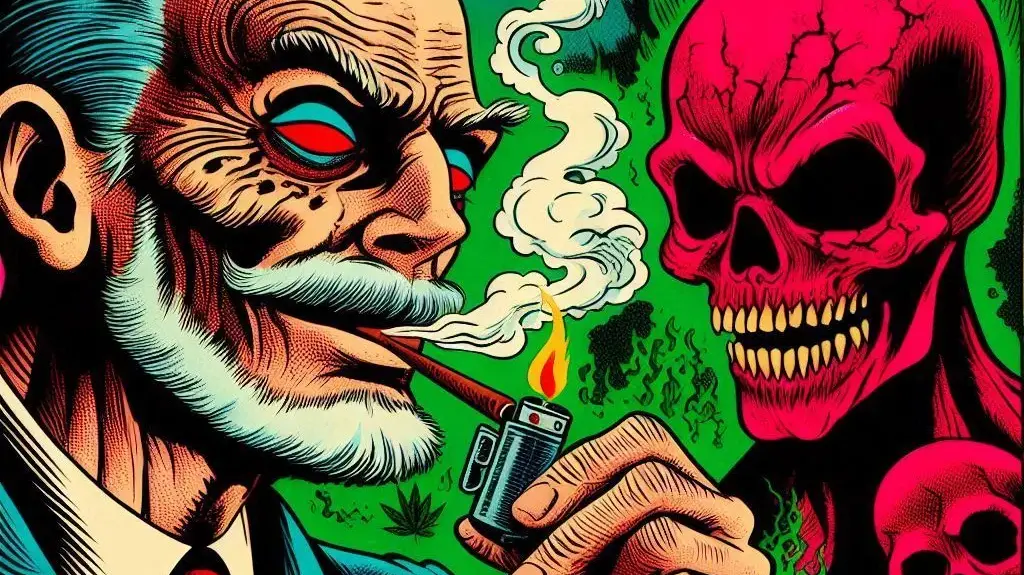
Related: Justice Department Reclassifies Marijuana as a Less Dangerous Drug
It’s so funny that in the 1960s everyone was like “weed’s not a big deal, man, just legalize it!”
And then they legalized it and a bunch of botanic scientists started messing with it and turned it into a seriously hardcore drug that makes you go insane.
Personally, I think it was a bit out of control to be putting people in prison for a few grams of weed. I don’t support the extreme drug war policies, even though I am a hardcore Nixon supporter. I think it should have been suppressed to an extent, but putting people in prison was just kind of nuts.
But legalizing it and then letting these scientists turn it into a hardcore psychedelic that drives everyone into schizophrenia? This is totally wild. At best, they could have just decriminalized possession.
But hey.
Making super-weed that makes everyone schizophrenic is also a good option, I guess.
CNN:
One may think young people are the main group enjoying the freedom of legalized weed, but in Canada, the greatest increase in users after legalization was among older adults — and sometimes it’s sending them to the hospital, according to new research.
The rate of emergency department visits for cannabis poisoning in older adults during the period of legalization of dried cannabis flower and edibles — October 2018 through December 2022 — in Canada was significantly higher than that of the pre-legalization period, according to a research letter published Monday in the journal JAMA Internal Medicine.
Oh wow so legalizing drugs makes more people do drugs huh I never would have supposed that this would be the case.
Edibles, which include baked goods, candies and beverages, are increasingly popular, said lead research author Dr. Nathan Stall, a geriatrician and clinician scientist at Sinai Health in Ontario. But some older adults may be unaware of the strength of today’s weed, and little is known about the health effects of legalizing edible cannabis on older adults — the age group with the largest growth in overall cannabis use a year after dried cannabis flower was legalized in Canada, Stall said.
“There’s a bit of an age-related bias that many health care practitioners, and frankly society, hold that older adults are not using drugs. And that’s not true,” Stall said. “We found that the largest increases in emergency department visits for cannabis poisoning among seniors occurred after edible cannabis became legal for retail sale in January 2020.”
These “edibles” are like, super strong. People have complete breakdowns. It’s like smoking PCP.
The authors used the Ontario Ministry of Health’s administrative data to examine the rates of emergency room visits for cannabis poisoning among older adults during the pre-legalization period — January 2015 to September 2018 — and the two legalization periods: October 2018 through December 2019, which permitted the sale of dried cannabis flower only, and January 2020 through December 2022, which marked the legalization of cannabis edibles.
When people have cannabis poisoning, according to Stall, they may experience confusion; psychosis, including hallucinations; anxiety or panic attacks; rapid heartbeat; chest pain; nausea; and vomiting.
To be fair, you don’t have to smoke weed to have those issues.
I have all those issues every day and I haven’t smoked weed since I was 19.
During the eight-year study period, there were 2,322 emergency department visits for cannabis poisoning in older adults who were age 69 on average. Nearly 17% of those adults were simultaneously intoxicated with alcohol, about 38% had cancer and 6.5% had dementia. Compared with pre-legalization, legalization period No. 1 saw a twice higher rate of emergency department visits for cannabis poisoning. The rate during the second legalization period tripled that of pre-legalization.
“This study provides a cautionary tale of legalization of substances without adequate research, education, and counseling of users regarding adverse effects and safe usage, particularly in older adults,” said Dr. Lona Mody and Dr. Sharon K. Inouye, who weren’t involved in the research, in a commentary on the research.
It needs to be de-legalized.
It was already effectively decriminalized. What was the point of legalizing it?
If it’s decriminalized but still illegal, it can’t be sold in shops, and people don’t think it’s normal and sanctioned by the government, so people are more careful.
It’s just common sense.
Extremely high reported marijuana usage amongst (specifically MTF) transgender people. Industrial strength weed in adolescence is inducing lifelong mental illness. pic.twitter.com/CbfMqd89g1
— the captive dreamer (@captivedreamer7) April 21, 2024
